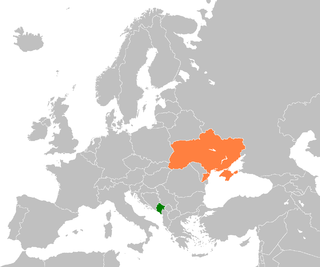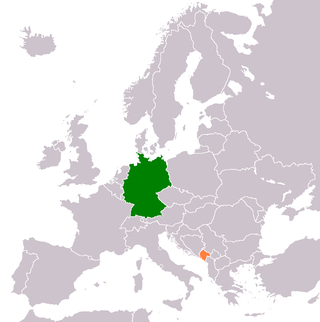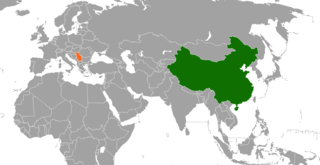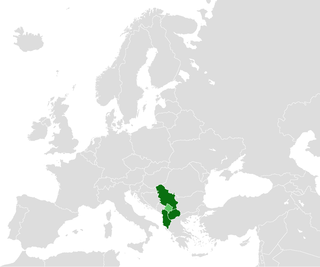
Since the breakup of the Socialist Federal Republic of Yugoslavia in the early 1990s, the foreign policy of the newly established Federal Republic of Yugoslavia was characterized primarily by a desire to secure its political and geopolitical position and the solidarity with ethnic Serbs in other former Yugoslav republics through a strong nationalist campaign. While the country was involved in Yugoslav Wars and therefore exposed to several rounds of devastating sanctions against Yugoslavia this involvement was often denied for political or ideological reasons. In the initial period Federal Republic of Yugoslavia unsuccessfully aspired to gain international recognition as the sole legal successor state to SFR Yugoslavia, the country which was one of the most prominent foreign policy subjects during the Cold War.

Podgorica is the capital and largest city of Montenegro. The city is just north of Lake Skadar and close to coastal destinations on the Adriatic Sea. Historically, it was Podgorica's position at the confluence of the Ribnica and Morača rivers and at the meeting-point of the fertile Zeta Plain and Bjelopavlići Valley that encouraged settlement. The surrounding landscape is predominantly mountainous terrain.

Milo Đukanović, pronounced[mǐːlodʑǔkanoʋitɕ] ; born 15 February 1962) is a Montenegrin politician who served as the president of Montenegro from 2018 to 2023, previously serving in the role from 1998 to 2002. He also served as the prime minister of Montenegro and was the long-term president of the Democratic Party of Socialists of Montenegro, originally the Montenegrin branch of the League of Communists of Yugoslavia, which governed Montenegro alone or in a coalition from the introduction of multi-party politics in the early 1990s until its defeat in the 2020 parliamentary election. He is the longest-ruling contemporary politician in Europe, having held key positions in the country for over 33 years. However, he was defeated by the 36-year-old centrist former economy minister, Jakov Milatović, after the presidential run-off held on 2 April 2023.

Demographic features of the population of Montenegro include population density, ethnicity, education level, health of the populace, economic status, religious affiliations and other aspects.

In a referendum on 21 May 2006, the people of Montenegro opted to leave the State Union of Serbia and Montenegro. This result was confirmed with a declaration of independence by the Montenegrin parliament on 3 June 2006. It simultaneously requested international recognition and outlined foreign policy goals.
Religion in Montenegro refers to adherents, communities, institutions and organizations of various religions in Montenegro. While Eastern Orthodox Christianity is the dominant religious denomination in Montenegro, there are also sizable numbers of adherents of both Catholic Christianity and Islam.

Montenegro–Ukraine relations relate to bilateral relations between Montenegro and Ukraine. Formal relations began on 15 June 2006 when Ukraine recognized Montenegro, less than two weeks after the Parliament of Montenegro declared the independence of Montenegro from Serbia. Both countries established diplomatic relations on 22 August 2006. Montenegro has an embassy in Kyiv. Ukraine has an embassy in Podgorica. Although economic ties are weak, Montenegro is a transit point for human trafficking between Ukraine and the rest of Europe.

Montenegro–Russia relations are foreign relations between Montenegro and Russia. Montenegro has an embassy in Moscow and Russia has an embassy in Podgorica.

German-Montenegrin relations are foreign relations between Germany and Montenegro. Both countries established diplomatic relations on 14 June 2006. Germany has an embassy in Podgorica. Montenegro has an embassy in Berlin and a general consulate in Frankfurt. Both countries are members of Council of Europe and NATO. Also Germany is an EU member and Montenegro is an EU candidate. In 1997 the German Bundeswehr used the Podgorica Airport for the Operation Libelle, which led to the first skirmish involving German forces since World War II.

China-Serbian relations are foreign relations between the People's Republic of China and the Republic of Serbia. Relations have been maintained since SFR Yugoslavia's recognition of PR China on October 1, 1949, while diplomatic relations between the two countries were formally established by the exchange of diplomatic notes between the two Foreign Ministers on January 2, 1955. China has an embassy in Belgrade and also maintains an office in Priština based on consent of the Government of Serbia from November 2006. Serbia has an embassy in Beijing and a consulate-general in Shanghai. In 2017, Serbia and China mutually abolished the requirement of obtaining an entry visa for its citizens.

Both Montenegro and the Republic of North Macedonia are full members of the Council of Europe and of the NATO. The Foreign Ministry of North Macedonia states the two countries have excellent political ties, without any open issues between the two countries. The embassy of North Macedonia to Montenegro is located in the capital city of Podgorica. Montenegro's embassy in North Macedonia is also located in the country's capital city, which is Skopje. Also, Montenegro has an honorary consulate in the city of Bitola.

North Korea–Serbia relations are the bilateral relations between Serbia and North Korea. The Socialist Federal Republic of Yugoslavia and the Democratic People's Republic of Korea had established diplomatic relations on October 30, 1948. Relations had been very close during the time of Josip Broz Tito and Kim Il Sung. Both leaders had taken a neutral stance during the Sino-Soviet split and maintained friendly relations with both the Soviet Union and China. Both Serbia and North Korea are members of the Non-Aligned Movement. Yugoslavia, of which Serbia was a part, was one of the movement's founding members. Both countries closed their embassies in each other's capitals in October and November 2001, respectively, for financial reasons. Nevertheless, they continue to enjoy a close relationship. The Serbian Embassy to North Korea is accredited from Beijing, China, and the North Korean embassy to Serbia is accredited from Bucharest, Romania.

Montenegro–Turkey relations are the bilateral relations between Montenegro and Turkey. Turkey officially recognized Montenegro on June 12, 2006. Diplomatic relations between the two countries were established on July 3, 2006. Both countries are full members of the Union for the Mediterranean, Council of Europe and NATO.

Albania has an embassy in Lisbon and 3 honorary consulates in Porto, Funchal and in the island of Madeira. Portugal has an honorary consulate in Tirana. The history of diplomatic relations of Albania and Portugal dates back to 1922, when Portugal recognized Albania's independence on May 25, 1922.

Montenegro–Spain relations are the bilateral and diplomatic relations between these two countries. Both countries are full members of the Council of Europe, and of the NATO. Also Montenegro is an EU candidate and Spain is an EU member. Montenegro has an embassy in Madrid. Spain is accredited to Montenegro from its embassy in Belgrade, Serbia.

The Open Balkan is an economic and political initiative of three participating states in the Balkans, those being Albania, North Macedonia and Serbia. The initiative has a total area of 131,935 km2 (50,940 sq mi) and an estimated total population of almost 12 million located in Central and Southern Europe. The official languages are Albanian, Macedonian and Serbian. Its administrative centres are the cities of Belgrade, Skopje and Tirana. With the establishment of the initiative, all three member states aim to increase trade and cooperation as well as improve bilateral relations.
Portuguese in Albania are citizens and residents of Albania who are of Portuguese descent.
















